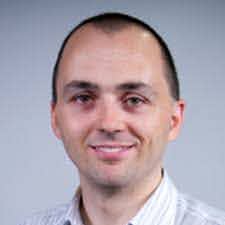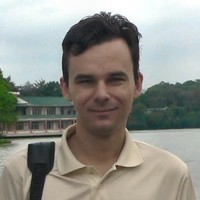

We are glad to announce the third annual PhD event in Computer Science research, hosted
by the Department of Computer Science of the University of Pisa. The event will be broadcasted
in live-streaming on the Teams platform of the University of Pisa.
A stunning event, with a number of inspiring presentations given by our special guests discussing their
view on the future of their studies.
The event is totally free and open to everyone: PhD students, undergraduate students, professors, researchers
as well as innovators and companies are warmly invited to attend.
If you are curious about what happened in the last few years, please have a look at the programs, slides, and pictures of the
first and
second event.
Click on the name of the speakers to follow the talks on Microsoft Teams:
3rd December 14:50 - 15:00,
join Opening remarks
3rd December 15:00 - 16:00,
join Marco Calderisi
3rd December 16:00 - 17:00,
join Luca Ascari
11th December 09:50 - 10:00,
join Opening remarks
11th December 10:00 - 11:00,
join Philippe Fournier-Viger
11th December 11:00 - 12:00,
join Dmitrij Lagutin
11th December 12:00 - 13:00,
join Davide Boscaini
The videos and the slides of the event will be available after each presentation.
In the Agenda section
you can find the direct link the video recording and the slides.

|
|
|---|
Antonio Brogi Coordinator of the PhD Program in Computer Science University of Pisa |
My path from chemist to data scientist, finally becoming an entrepreneur. Kode srl, instructions for use.
Are we all Data Scientists? Marco Calderisi CEO/CTO, Kode Slides · Video |
Neurotechnology is a rapidly emerging sector, where many small companies are generating significant innovation. The necessity for a deeply multidisciplinary approach, still strongly founded on research, as well as the perspectives on core technologies are some aspects of this exciting multifaceted field, often still in search for a clear killer application. This talk illustrates the approach taken in Camlin in the last years, and highlights some aspects which are crucial for transforming a research into a sustainable and growing neurotech business.
From research to industry: a case history in neurotechnology Luca Ascari Director of Biomedical Research, CAMLIN Group |
|
|
|---|
Antonio Brogi Coordinator of the PhD Program in Computer Science University of Pisa |
Discovering interesting and useful patterns in symbolic data has been the goal of numerous studies. Several algorithms have been designed to extract patterns from data that meet a set of requirements specified by a user. Although many early research studies in this domain have focused on identifying frequent patterns (e.g. itemsets, episodes, rules), nowadays many other types of interesting patterns have been proposed and more complex data types and pattern types are considered. Mining patterns has applications in many fields as they provide glass-box models that are generally easily interpretable by humans either to understand the data or support decision-making. This talk will first highlight limitations of early work on frequent pattern mining and provide an overview of current problems and state-of-the-art techniques for identifying interesting patterns in symbolic data. Topics that will be discussed include high utility patterns, locally interesting patterns, and periodic patterns. Lastly, the SPMF open-source software will be mentioned and opportunities related to the combination of pattern mining algorithms with traditional artificial intelligence techniques will be discussed.
Advances and challenges for the automatic discovery of interesting patterns in data Philippe Fournier-Viger Full professor, Harbin Institute of Technology (Shenzhen, China) Slides · Video |
Traditional authentication solutions on Internet require either having a separate user account for different services, or using single sign-on solutions provided by social media companies, which are bad for privacy and competition. This presentation discusses how novel technologies, such as Decentralized Identifiers (DIDs) and Verifiable Credentials (VCs) can be utilized to improve privacy and security in various use cases, including Internet of Things.
Decentralized Identifiers, Verifiable Credentials, and Internet of Things Dmitrij Lagutin Researcher, Aalto University (Espoo, Finland) Slides · Video |
In the last few years, 3D deep learning methods have proven their effectiveness in a wide range of applications, outperforming their hand-crafted predecessors in almost any task. Unfortunately, most of the proposed models are tested on synthetic data, created by experts with computer graphics software, quite different from the data real-world applications are interested in. The reasons behind the popularity of synthetic data range from the scarce availability of public datasets of real data to the difficulty to annotate them. Models trained on synthetic data, however, often fail to generalize to real data. In this talk, I will present two recent works which tackle real-world challenges overcoming such problems. The first approach presents a novel self-supersivion method to improve classification of 3D shapes of every-day furniture by exploiting knowledge learned from synthetic models from the same semantic categories. The second approach presents a novel feature extraction method and evaluates it in the context of shape registration of indoor and outdoor 3D scenes.
3D deep learning to the test of real-world challenges Davide Boscaini Researcher, Fondazione Bruno Kessler Slides · Video |

Luca Ascari (1975) is an electrical engineer with a PhD in Biorobotics from Scuola Superiore Sant'Anna (Pisa, I). In 2007 Dr, Ascari co-founded Henesis, a startup focused on applied AI, which joined the CAMLIN group in 2014. In his role as Director of Biomedical Research, he leads a team of researchers developing AI-powered wearable devices for post-ictus neurorehabilitation and brain computer interfaces. Dr Ascari has co-author 40 international scientific papers and hold more than 10 patents. He also serves as executive president of the Spin Off Club of Scuola Superiore Sant'Anna and industry expert for the European Commission.

Davide Boscaini was born in Verona (Italy) in 1988. He received a B.S. degree in Applied Mathematics in 2010 and a M.S. degree in Mathematics in 2012, both from the University of Verona (Italy). His master thesis on "Spectral Methods for Shape Analysis" was developed during an intership at the Vision, Image, Processing and Sound Lab on topics related with the analysis of 3D deformable objects. The desire to deepen his knowledge in this topic led Davide to start a Ph.D. at the University of Lugano (Switzerland) under the supervision of prof. Michael M. Bronstein. During the Ph.D. his research focussed on merging spectral approaches and deep learning techniques to develop novel algorithms for 3D Shape Analysis. Davide's efforts contributed to the birth of a new research field, called Geometric Deep Learning, aiming at extending deep learning techniques to geometric domains such as 3D shapes and graphs. He received his Ph.D. degree in Computer Science in 2017 with a dissertation on "Geometric Deep Learning for Shape Analysis". He is currently a researcher at the Technologies of Vision research unit of the Fondazione Bruno Kessler in Trento (Italy).

Marco Calderisi (Ph. D) received a degree in Chemistry (2000) at Pisa and a PhD in Metabolomics (2010) at Siena. He worked as chemometric consultant from 2003. He has experience in the field of research and development in the industry, but his interests include also the environment, wearable sensors, and data visualization. His skills in Experimental design, Data mining, Multivariate statistics and Machine Learning allowed him to participate to many research projects and to numerous international conferences and to publish scientific papers. He is currently CEO of Kode, a company that develops Machine Learning solutions for the industry and healthcare. He is founder of Terradata, a spin-off of the University of Siena that works on biomonitoring, and founder, as well as responsible of the data scientist area, of one of the few spin-offs of Scuola Normale Superiore (Pisa), INTA, that is currently active in the sector of biosensing with nanosensors.

Philippe Fournier-Viger (Ph.D) is a Canadian researcher, full professor at the Harbin Institute of Technology (Shenzhen, China). Five years after completing his Ph.D., he came to China and became full professor at the Harbin Institute of Technology (Shenzhen), after obtaining a title of national talent from the National Science Foundation of China. He has published more than 290 research papers in refereed international conferences and journals, which have received more than 6600 citations. He is associate editor-in-chief of the Applied Intelligence journal (Springer) and editor-in-chief of Data Science and Pattern Recognition. He is also the founder of the popular SPMF open-source data mining library, which provides more than 190 algorithms for identifying various types of patterns in data, and has been used in more than 830 papers since 2010. He is editor of the book “High Utility Pattern Mining: Theory, Algorithms and Applications” published by Springer in 2019, and co-organizer of several workshops and special tracks such as the Utility Driven Mining and Learning workshop held at the KDD 2018, ICDM 2019 and ICDM 2020 conference.

Dr. Dmitrij Lagutin received his doctorate degree from Aalto University in 2010 in the field of network security. He has worked as a researcher in several EU research projects in the area of information centric networking, including PSIRP, PURSUIT, and POINT. Currently, he is the project coordinator and researcher in EU H2020 SOFIE project, which enables interoperability between IoT platforms by using distributed ledger technologies. His research interests include security, privacy, Internet of Things, distributed ledger technologies, and networking.
Daniele Di Sarli
Andrea Lisi
Daniela Rotelli
Andrea Valenti